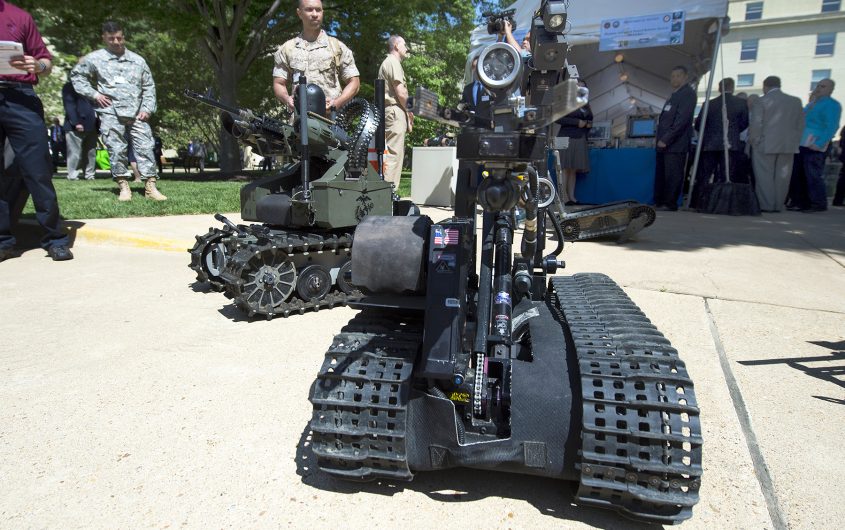
Department of Defense photo by EJ Hersom
Germany Needs to Consider Military AI

Zhijiang Zhao
Research Intern
Zhijiang Zhao is a research intern at AICGS for Fall 2020. He supports fellows with research, monitors the news for articles related to AICGS’ research agenda, manages the outreach database, and writes for the Institute’s website.
Zhijiang recently completed his MA in German and European Studies at Georgetown University’s Walsh School of Foreign Service. He is interested in China and the future of transatlantic relations, artificial intelligence, and German history.
Zhijiang was an exchange student at the University of Mainz from 2016 to 2017. He interned at a local history research institute. He also lived in Berlin for a while, where he helped with Sarah Lawrence College’s summer art program. Zhijiang speaks Mandarin and German. He is learning French.
In November 2019, the German federal government published an interim report, updating the public about Germany’s one year of artificial intelligence (AI) progress since the launch of its national AI strategy in 2018. The report celebrates research achievements and the surge of AI start-ups and patent applications across the country, but it does not mention any military AI development. The omission of this topic in the report reflects a notable feature of the contemporary German reluctance to discuss military and defense policy. Compared to the ministries of economics, research, and labor, the Federal Ministry of Defense (BMVg) and the Bundeswehr play a marginal role in Germany’s AI development. As Ulrike Franke with the European Council on Foreign Relations points out, Germany views AI primarily through an economic lens, while the military, security, and geopolitical elements of AI are absent from the national strategy. In contrast, the United States and China are ambitious about the use of AI in the military and national security realm. Their defense departments are crucial architects who have devoted major sections to AI applications in warfare in their respective national AI strategies.
Compared to the ministries of economics, research, and labor, the Federal Ministry of Defense (BMVg) and the Bundeswehr play a marginal role in Germany’s AI development.
In fairness, the BMVg and the defense establishments have weighed in the topic of AI since 2018. For example, the BMVg interviewed Uwe Beyer, head of the Frauenhofer Institute for Intelligent Analysis and Information Systems, and discussed what AI means for the future of the Bundeswehr. In 2019, the German Army Concepts and Capabilities Development Center (Amt für Heeresentwicklung, ACCDC), an agency subordinate to the German Army Headquarters, published a position paper titled “Artificial Intelligence in Land Forces.” This document not only explores the future of military AI, but also recommends the Bundeswehr set up an AI Work Bench, an AI Development Center, and an AI Data Center for the German armed forces. According to ACCDC, it planned to publish another two independent documents on military AI: “Robotics and Autonomous Systems (RAS) in Land Forces” and “Digitization in Land Forces.” However, there have been no developments in the publications of these two papers. Furthermore, there is no guarantee that the federal government will incorporate ACCDC’s ideas in the country’s overall AI development because the national AI blueprint lacks a specific roadmap regarding military AI. It only has one sentence about the Bundeswehr’s responsibility: “the use of AI-based technologies and systems will have implications for the armed forces and is therefore an important issue to be taken into account for the future of the Bundeswehr.” Netzpolitk.org, a German blog on digital rights and culture, also suggests that the Ministry of Defense does not receive funds from the national AI budget allocations.
Instead of talking about what AI can do improve the Bundeswehr’s military capability, the German government feels more comfortable discussing preventive regulations of lethal autonomous weapons systems (LAWS). It reflects Germany’s pacifist culture. In a 2018 survey by Ipsos, 72 percent of the respondents in Germany opposed the use of LAWS, while only 14 percent supported it. But inside the federal government there have been different voices. In January 2020, the Left and the Green Party’s bids to ban “killer robots” were rejected by Angela Merkel’s coalition, who believed a ban is premature. In a report prepared by SWP Berlin, the authors proposed that the BMVg should produce a strategy document to help the government take a clear position on the regulation of LAWS. Such a document could be part of the overall national AI strategy, which will give the defense department a greater voice in Germany’s AI discussion and the opportunity to study civilian AI technologies for military purposes.
Germany should consider integrating military AI as an important section in the national AI strategy.
In short, Germany should consider integrating military AI as an important section in the national AI strategy. This will help advance Germany and Europe’s own security and strategic autonomy. Germany can work with France, which designed a comprehensive guide in late 2019, outlining the country’s approach to military AI. Both nations already agreed to intensify their cooperation in the economic dimension of AI. For example, a working group of the economic ministries plans to deal with cooperation in AI focusing on data sharing, cross-border experimental zones, transfer of research results to business, and technical and ethical standards. Such cooperation can prepare Germany and France for enhancing their data sharing and transfer capability in the security realm. Franco-German cooperation on AI is also a good start for Germany to start working with other European allies to improve defense-relevant AI research in Europe. For instance, the establishment of a data mobility framework that would guide future concepts, models, algorithms, data sharing, access to elastic computing power, and sophisticated testing and training. A NATO report points out that Germany has not invested substantial resources into defense-related AI, while other defense innovators have already done so. Having a military strategy will help Germany fulfill its leadership role that its allies expect.








